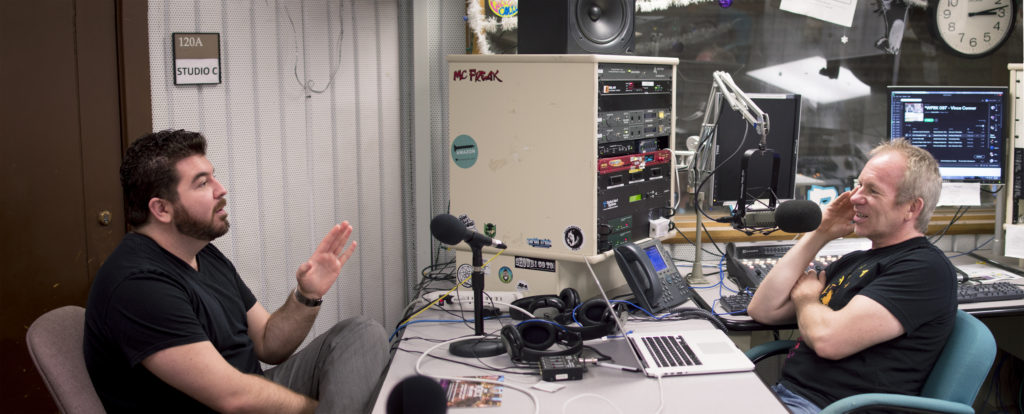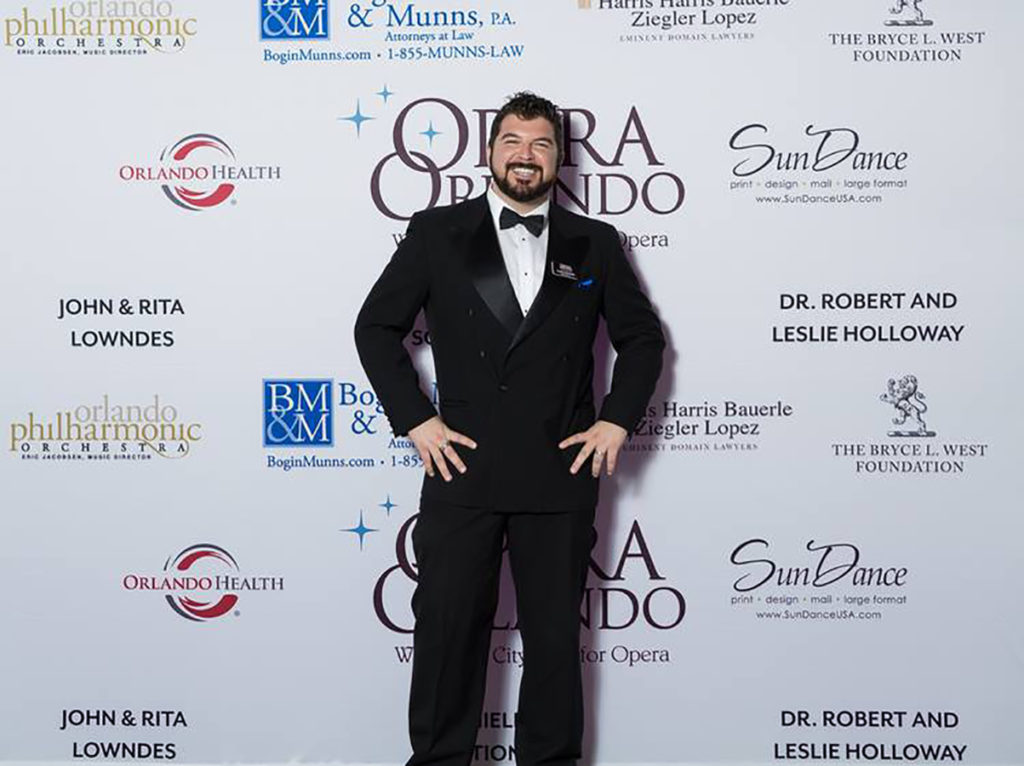Vincent Connor, the new General Director of Opera Orlando, appeared on my WPRK radio show, Zero Crossings, to talk about Opera Orlando, their One Voice Orlando concert on September 11, and Opera Orlando’s upcoming season. What follows is an excerpt from a two-hour conversation.
Charlie Griffin: You’re the General Director of Opera Orlando, and it’s a bit of a phoenix story. Tell me about the genesis of the newest incarnation of opera in Orlando.
Vincent Connor: Yes. Yes! We rose from the ashes! Opera is very dear to my heart. I grew up here, in Winter Park, and came back here after twelve years. I grew up with Orlando Opera, which was the prominent opera company at the time, and saw magnificent productions there. They did more traditional opera. I can arguably say that the reason I went into opera was because of Orlando Opera. They closed in 2009 during the recession. In its place grew up the Florida Opera Theater, which had been growing by about 20% every year. Some of the board members reached out to me, because they had been following my career and knew that I was from here. I had been directing and singing opera and they contacted me about this opportunity.
So they actively recruited you. That must feel good.
Yeah! It’s always great to be able to go back where home is. So many directors and singers and professors of opera never get the chance to work where they grew up. To come home was like dream come true, after I’d been performing all over the world.
Where had you gone during those twelve years?
I went to Florida State University in Tallahassee for my undergrad and got my master’s degree at the University of Arizona. I loved the desert landscape, I loved the heat, I loved everything about Arizona. I was there for three years. I started focusing on directing as well as singing. Knowing that the life of a singer was a tough one, I wanted to get educated in two realms.
Is there not a benefit to be a male singer, though? There’s a lot less competition.
Yes, there is. It doesn’t take away how hard the lifestyle is, though. The formula is scary—there are about ten women auditioning for every one male at Opera Orlando. It’s a tough business.
Going on, where were you when the board members from Florida Opera Theater recruited you?
After Arizona, I went to the University of Missouri at Kansas City for my doctorate. After I finished my coursework, I moved to Philadelphia to teach voice and opera at the University of Delaware. It was while I was in Philly that I got the phone call.

Vincent Connor interviews with Charlie Griffin’s Zero Crossings on WPRK, September 12, 2016. photo by Mariana Mora
Why do you think that Orlando Opera didn’t survive the recession?
From a business perspective, there were some poor administrative and fiscal decisions made, regarding their endowment. From an artistic standpoint, Orlando Opera had taken a more traditional approach, and it can be argued that they weren’t willing to change with the times. Opera America (a national service organization that supports opera and the musical arts internationally with education and awareness programs) is so wonderful. I just got back from a two-week seminar in New York. And Opera America is all about really learning your audience; what makes them tick. If you don’t do that research to see what excites them, invigorates them, then the organization will falter.
There has to be a certain amount of experimentation. You’re trying to strike a balance between multiple factors: educating versus pandering to versus alienating your audience. How do you find that pocket, and how was the seminar in New York trying to address dwindling audiences?
What I just went to in New York was called the Opera America Leadership Intensive Program. They identify young, aspiring administrators who want to make a difference. There were people from Sweden, London, Vancouver, Houston, San Francisco. It was such an honor to be chosen to participate because Opera Orlando is such a small company compared to the rest. But what I learned is that it’s about balance. We can’t just aim at one demographic or one type of opera production. It’s hard to find, because so much of this relies on subjective taste. In the main, though, the seminar was about governance, fiscal responsibility, board management, storytelling, and public speaking.
Gabriel Preisser, Opera Orlando’s Artistic Director, is also a singer. How common is it for the main administrators at an opera company to also be singers?
It’s actually not very common. We’re trying to lay a foundation for the future, and so we are both taking active roles in performance and direction. But it won’t go on indefinitely.
Going back to my initial question about its rebirth, why is Opera Orlando popping up now? You stated earlier that the recession was a factor for Orlando Opera’s demise. Is it because the recession is over? If so, how vulnerable is the organization to a fresh economic downturn?
You know, in the arts you really have to take calculated risks. And I felt like, with the rebranding of Florida Opera Theater into Opera Orlando, it was time, because all the variables were in place. It had been ten years since Orlando Opera had closed; Florida Opera Theater was doing really well and there was growth there. And, I was at a place in my career where I could really afford to take a chance, and I felt this calling, like I really needed to do this.
Speaking of a calling, talk about One Voice Orlando and the performance on September 11.
I actually moved back here the week of the Pulse shootings. It wasn’t quite the homecoming I expected. Opera Orlando’s email inbox was just exploding. Singers from everywhere, directors, and conductors were all asking what they could do to help. And we did immediately respond—we were part of Beautiful Together, and we organized a benefit with singers at a church and raised $4000 for the OneOrlando Fund. We wanted to do more, and identified six charities that we really wanted to help, who have done amazing things since the Pulse tragedy. Those are Orlando Health’s Level One Trauma Center; the first responders, doctors and nurses. They did so much and their resources are just depleted. The Zebra Coalition, a wonderful organization that is geared toward helping underprivileged gay, lesbian, and bisexual teens. The Orlando LGBTQ Community Center has been huge since the tragedy and they’ve done so much. Interfaith Council of Central Florida and the Holocaust Center’s UpStanders: Stand Up to Bullying Initiative both really spoke to us. And one of the organizations I’m really proud of is Proyecto Somos Orlando, which is a hispanic organization that has done amazing things in the community. A high percentage of those who were killed wasn’t only LGBTQ but also Hispanic. They were on the forefront of the tragedy and they realized that Spanish wasn’t being spoken, and some survivors and victims’ families needed translators. They also offered counseling and legal services—whatever was needed. We were inspired by them.
Let’s continue with the idea of experimentation and risk-taking. Mr. Preisser has participated in a lot of contemporary opera, works by Kevin Puts, Tobias Picker, Ricky Ian Gordon, Daron Hagen, Mark Adamo, and Dominick Argento. Is there a possibility of new work being done here?
Both Gabe and I are really passionate about new work and we both believe that to make opera relevant, we have to focus on what’s happening here and now. So many opera companies are geared towards producing new work, and that is absolutely on our docket. But it’s also often expensive and we need to have the finances in place to make that happen.
What we’ve decided to do for our first season is Donizetti’s Don Pasquale on November 18th and 20th, a comedic tale, directed by me, about an old bachelor who refuses to get married; Menotti’s Amahl and the Night Visitors on December 11th through the 20th, which is sort of our Christmas tale, directed by Eric Pinder; and Mozart’s Don Giovanni on March 24th-26th. We’re going traditional with Don Pasquale, family oriented with Amahl, and “high concept” with Don Giovanni.
Have you mapped out multiple years of activity?
Yes, but I can’t talk about it yet. I can tell you that we want to be really active in things like the Fringe Festival. We’re interested in adaptation, like Peter Brook’s adaptation of Bizet’s Carmen, which cuts the opera down to 90 minutes but retains its compositional integrity. We’re also interested in playing site-specific works in unconventional spaces, like doing Le Nozze di Figaro in a mansion because that’s where the opera is set. I love “high concept” treatments of opera—our current season’s Don Giovanni is the story of Don Juan, the old Spanish tale, and we’re going to have it take place on a college campus. So, we’re going hit a few hard issues: we’re going to talk about date rape and womanizing. We’re trying to take social stereotypes and tell the story in a completely different way.
You can see more at:

